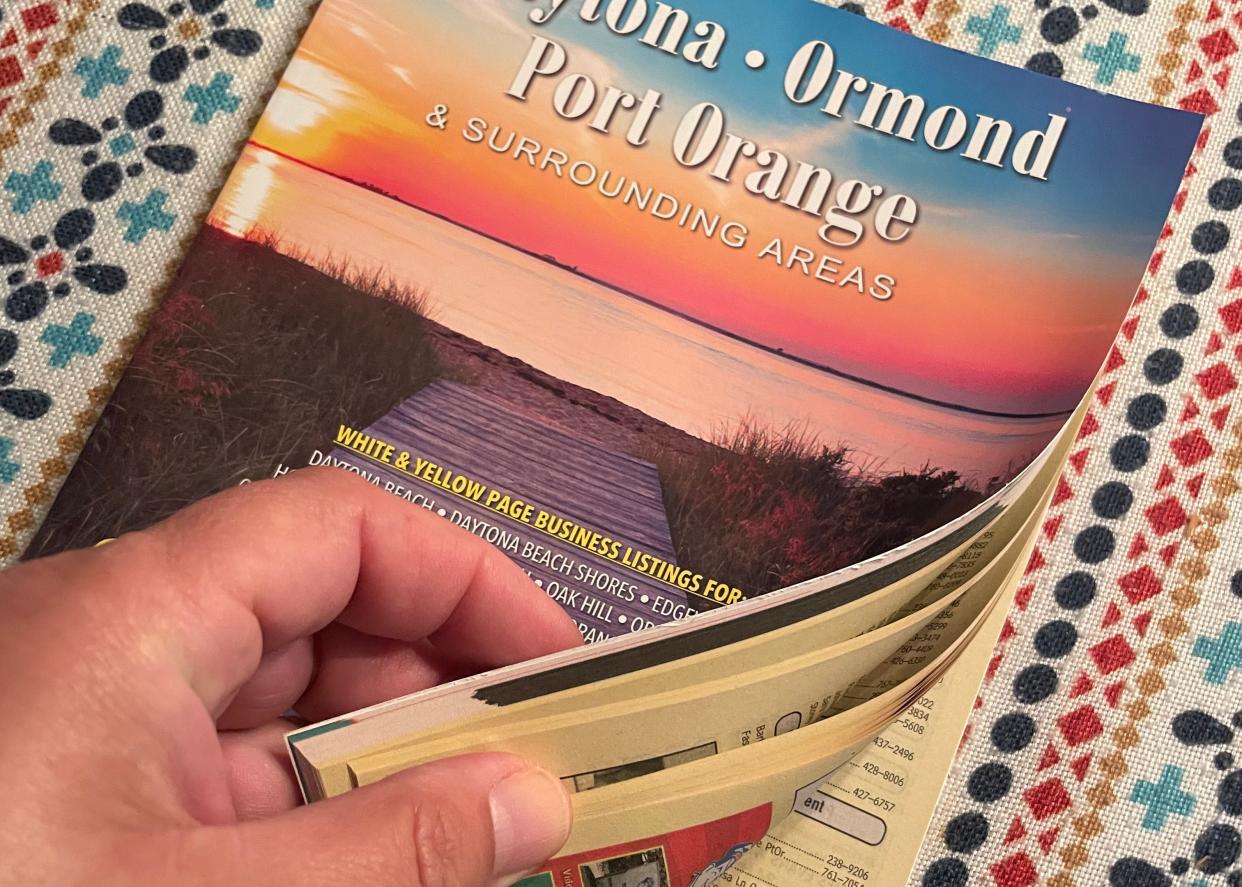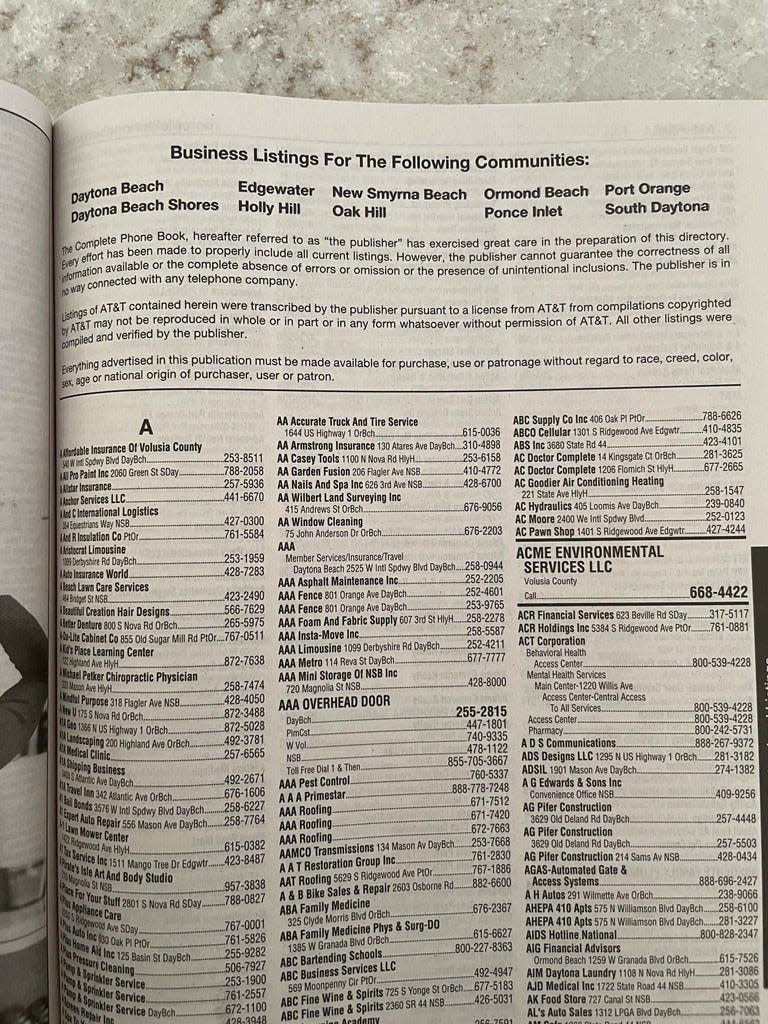Did you get a phone book this year? Also, for some of us: what is a phone book?

If you live in eastern Volusia County, you may have recently received a phone book.
For some of us, it may have been a pleasant (or unwanted) surprise and a nostalgic reminder of those pre-digital days of yore when instead of googling businesses and restaurants "near me," we let our fingers do the walking. Younger readers may have been bewildered as to why someone bothered to print out a Yelp directory without including the reviews.
Phone books, once a ubiquitous and utterly necessary presence in every household and phone booth (you may need to google "phone booths") have all but disappeared from kitchen counters, refrigerator tops and end tables across the land, but they are still out there.
What is a phone book?
Practically since the first one in 1878 (a piece of cardboard with the only 50 people and businesses in New Haven, Connecticut that had phones at the time), if you had a phone in your home, you had a phone book. People who lived near a border or regularly traveled to other cities often had multiple phone books stacked away.
Also called phone, city or business directories, phone books are printed lists of the names, addresses and phone numbers of every person or business in a geographical area registered with the phone company. If you knew someone's name, or even just their last name, you could probably find their address and phone number in the bound stack of tissue-thin paper. If someone asked for your own information, you could just casually say, "I'm in the book."
They were also commonly used as child boosters, notepads, bug killers, doorstops, short stepstools, table levelers, and fire starters.
Phone books are usually divided into at least two sections. The white pages were residential listings, the yellow pages were for businesses, broken into categories and listed by alphabetical order. Yes, this is why there are so many businesses with names like AA Auto Repair: they wanted to be the first ones you saw when you went looking.
Some phone books also had blue or green sections with local government directories, and might also include useful sections on poison control, first aid, maps and other helpful items to have at hand.
Everyone was in there, unless you requested (and usually had to pay) to keep your number hidden or "unlisted." Along with the simple list of businesses, the yellow pages also allowed companies to pay for bold text or ads to run nearby, which made phone books an extremely profitable annual publication.
Initially, phone books were produced by the phone company, the American Bell Telephone Company, which later moved its exchange companies under American Telephone & Telegraph (AT&T). The Department of Justice finally broke up "Ma Bell's" near-total phone monopoly in 1984 and the Telecommunications Act of 1996 forced the national phone companies to sell their listings to smaller independent ones. Local production of phone books surged into a multi-billion-dollar business that remained highly profitable until the early 2000s.
Why did phone books stop?
The internet. When people could just search for a phone number on their computer (and later their phone), they weren't interested in a bulky and inconvenient wad of paper. And as sites like Angie's List, Yelp, TripAdvisor and Google began adding more benefits to their listings such as pictures and customer reviews, a simple one-line listing or paid ad just didn't cut it anymore. On Facebook or on hyperlocal sites such as NextDoor, you can just ask your friends and neighbors for recommendations.
Also, everyone started moving away from landlines to cellular phones, which weren't listed in phone books, making the white pages increasingly useless. Directories moved online to whitepages.com (residential) and therealyellowpages.com (businesses and organizations), along with thousands of independent phone number lookup and reverse-lookup sites. People were throwing out their phone books as soon as they showed up on the doorstep like 5-pound wads of junk mail and asking phone companies to please stop.

By 2007, Florida was one of the first states to exempt local telephone carriers from the requirement to distribute printed white-page phone books to all residential customers. Many states moved to an opt-in or out system. The rest quickly followed, encouraged by the White Pages' "Ban the Phone Book" campaign that pointed out the waste of paper, the cost to the phone companies, and the impact on landfills of an annual 165,000 tons of waste.
Yellow-page business directories continued for much longer but finally, those faded as well. But they're still available for people who find them easier to deal with, more convenient to flip through, or just like the reassurance of a helpful resource that can't run out of power.
How do I get a printed phone book?
Aside from local companies such as The Complete Phone Book that serves Volusia County, phone books may be available through your phone service provider or from the big national companies that supply them:
The Real Yellow Pages: Call 844-339-6334 to order directories, or to opt out.
Dex Media: This company, the result of two smaller directory companies merging, once provided directories on request to landline subscribers from Verizon, FairPoint and Frontier but no longer offers that option on its website. People interested in physical directories are directed to the Real Yellow Pages instead.
Frontier Communications: Frontier provides some customers with printed phone books but no longer has the option on its site to request one.
Some cities may offer business directories on request. Check with your local chamber of commerce.
How do I stop getting printed phone books?
Not many people get them without asking anymore, but if you are and you want them to stop it's pretty easy. Just visit yellowpagesoptout.com and enter your ZIP code to get started.
This article originally appeared on The Daytona Beach News-Journal: Phone books still exist. Here's how to get one (or opt out of them)

